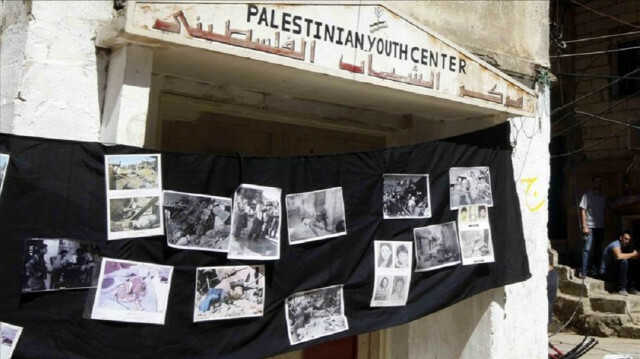
Mahmoud Hashim spends his days at the Palestinian Chess Center, giving children at the Shatila camp some training in the game and performing many other activities aimed at promoting their national identity, which only belongs to Palestine, he says.
Hashim, who was born and raised in the camp, still remembers the worst day he lived through there, on the eve of Sept. 16, 1982, when the sound of live bullets alerted him to an urgent incident.
"We noticed an abnormal movement, louder on the Western Street,” he said referring to an area in the camp.
“I can't believe the killers were normal humans. They had lost their humanity and mercy," he recalled.
That night, Hashim and his friend walked around, trying to understand what was happening.
"People were running on the roads, screaming, but we continued in the opposite direction. We were not able to understand," he said.
At the time, the Palestinian resistance factions had left the Palestinian camps in Lebanon and security issues were under the control of the Lebanese Armed Forces.
The incidents are recorded in history as the Sabra and Shatila massacre, an attack against Palestinians and Lebanese citizens by Israeli forces and Lebanese Phalangist militia.
According to historical accounts, around 3,500 civilians were killed during the widespread massacre through Sept. 16-18, 1982.
- Chaos and confusion
Hashim recalls the state of utter confusion and chaos on that day.
“No one knew what was happening. We were not able to reach the Western Street and Sabra area. It was like a doomsday scenario,” he said.
A few hours later, a British journalist went with Hashim on a motorcycle to Western Street despite the high risk. When they reached the area, they saw tens of bodies on the roads.
According to Hashim, who lost his uncle and two of his cousins in the massacre, the bodies lay on the streets for many days.
“The sight made me forget that the killers could still be lingering around, and maybe they'd kill me,” he recalled.
“It was awful. I saw a man from whom I used to buy groceries killed by a hatchet that sliced open his head. They killed my uncle too and his horses. I still remember the victim who was decapitated. He was naked,” he added.
After a short respite, the shooting resumed.
“We survived miraculously,” he said.
The massacre left lasting trauma on Hashim. But, at the same time, it forced him to work hard with the children in the camp to give them a clear and stable national identity.
He founded the Palestinian Chess Centre to support children.
“I receive around 70 children in each chess class,” he said.
In addition to chess, the center offers drawing, language and history lessons to students.
“This generation has to be in a continuous connection with its homeland. The victims cannot be forgotten,” he said.













